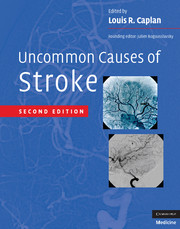Book contents
- Uncommon Causes of Stroke
- Uncommon Causes of Stroke
- Copyright page
- Contents
- List of Contributors
- Preface
- PART I: INFECTIOUS AND INFLAMMATORY CONDITIONS
- PART II: HEREDITARY AND GENETIC CONDITIONS AND MALFORMATIONS
- 16 PULMONARY ARTERIOVENOUS MALFORMATIONS
- 17 HEREDITARY HEMORRHAGIC TELANGIECTASIA (OSLER–WEBER–RENDU DISEASE)
- 18 CEREBRAL AUTOSOMAL DOMINANT ARTERIOPATHY WITH SUBCORTICAL INFARCTS AND LEUKOENCEPHALOPATHY (CADASIL)
- 19 CEREBROVASCULAR COMPLICATIONS OF FABRY’S DISEASE
- 20 MARFAN’S SYNDROME
- 21 PSEUDOXANTHOMA ELASTICUM
- 22 EHLERS-DANLOS SYNDROME
- 23 PROGERIA
- 24 MELAS AND OTHER MITOCHONDRIAL DISORDERS
- 25 STURGE-WEBER SYNDROME
- 26 VON HIPPEL-LINDAU DISEASE
- 27 ANEURYSMS
- 28 ARTERIOVENOUS MALFORMATIONS OF THE BRAIN
- 29 CEREBRAL CAVERNOUS MALFORMATIONS AND DEVELOPMENTAL VENOUS ANOMALIES
- 30 CEREBROVASCULAR MANIFESTATIONS OF NEUROFIBROMATOSIS
- 31 MENKES DISEASE (KINKY HAIR DISEASE)
- 32 WYBURN-MASON SYNDROME
- PART III: VASCULAR CONDITIONS OF THE EYES, EARS, AND BRAIN
- PART IV: DISORDERS INVOLVING ABNORMAL COAGULATION
- PART V: SYSTEMIC DISORDERS THAT ALSO INVOLVE THE CEREBROVASCULAR SYSTEM
- PART VI: NONINFLAMMATORY DISORDERS OF THE ARTERIAL WALL
- PART VII: VENOUS OCCLUSIVE CONDITIONS
- PART VIII: VASOSPASTIC CONDITIONS AND OTHER MISCELLANEOUS VASCULOPATHIES
- PART IX: OTHER MISCELLANEOUS CONDITIONS
- Index
23 - PROGERIA
from PART II: - HEREDITARY AND GENETIC CONDITIONS AND MALFORMATIONS
Published online by Cambridge University Press: 06 January 2010
- Uncommon Causes of Stroke
- Uncommon Causes of Stroke
- Copyright page
- Contents
- List of Contributors
- Preface
- PART I: INFECTIOUS AND INFLAMMATORY CONDITIONS
- PART II: HEREDITARY AND GENETIC CONDITIONS AND MALFORMATIONS
- 16 PULMONARY ARTERIOVENOUS MALFORMATIONS
- 17 HEREDITARY HEMORRHAGIC TELANGIECTASIA (OSLER–WEBER–RENDU DISEASE)
- 18 CEREBRAL AUTOSOMAL DOMINANT ARTERIOPATHY WITH SUBCORTICAL INFARCTS AND LEUKOENCEPHALOPATHY (CADASIL)
- 19 CEREBROVASCULAR COMPLICATIONS OF FABRY’S DISEASE
- 20 MARFAN’S SYNDROME
- 21 PSEUDOXANTHOMA ELASTICUM
- 22 EHLERS-DANLOS SYNDROME
- 23 PROGERIA
- 24 MELAS AND OTHER MITOCHONDRIAL DISORDERS
- 25 STURGE-WEBER SYNDROME
- 26 VON HIPPEL-LINDAU DISEASE
- 27 ANEURYSMS
- 28 ARTERIOVENOUS MALFORMATIONS OF THE BRAIN
- 29 CEREBRAL CAVERNOUS MALFORMATIONS AND DEVELOPMENTAL VENOUS ANOMALIES
- 30 CEREBROVASCULAR MANIFESTATIONS OF NEUROFIBROMATOSIS
- 31 MENKES DISEASE (KINKY HAIR DISEASE)
- 32 WYBURN-MASON SYNDROME
- PART III: VASCULAR CONDITIONS OF THE EYES, EARS, AND BRAIN
- PART IV: DISORDERS INVOLVING ABNORMAL COAGULATION
- PART V: SYSTEMIC DISORDERS THAT ALSO INVOLVE THE CEREBROVASCULAR SYSTEM
- PART VI: NONINFLAMMATORY DISORDERS OF THE ARTERIAL WALL
- PART VII: VENOUS OCCLUSIVE CONDITIONS
- PART VIII: VASOSPASTIC CONDITIONS AND OTHER MISCELLANEOUS VASCULOPATHIES
- PART IX: OTHER MISCELLANEOUS CONDITIONS
- Index
Summary
Keywords
- Type
- Chapter
- Information
- Uncommon Causes of Stroke , pp. 145 - 148Publisher: Cambridge University PressPrint publication year: 2008



